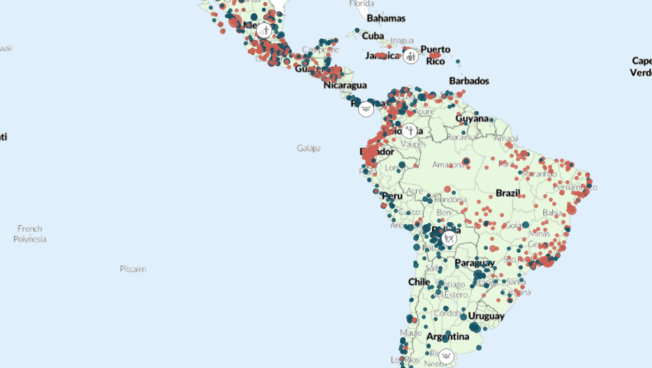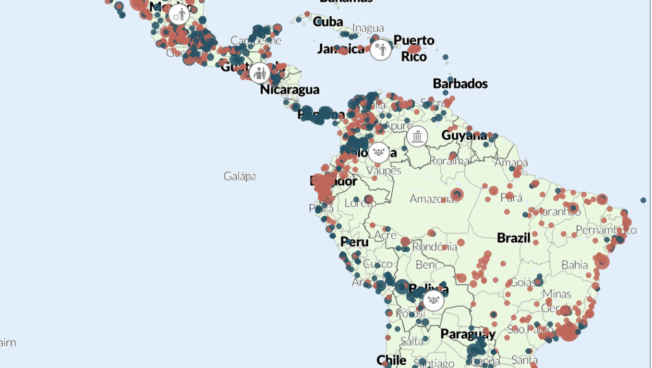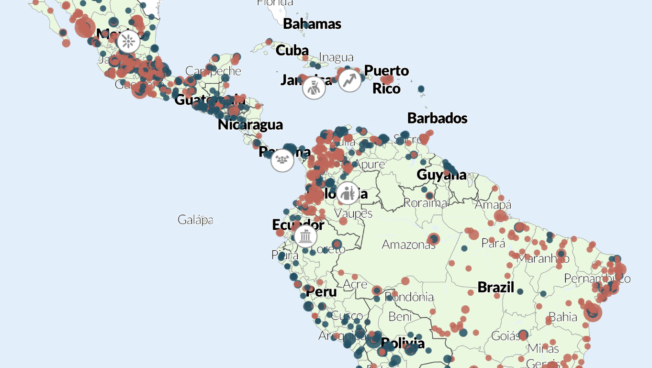Regional Overview
Latin America and the Caribbean
April 2025
Posted: 3 April 2025
In this Regional Overview covering March 2025
- Argentina: Police repression against retirees triggers discontent
- Colombia: Violence surges in the northeast as the ELN clashes with FARC dissidents and security forces
- Haiti: Police forces resort to the use of drones in lethal anti-gang operations in Port-au-Prince
- Honduras: Primary elections in Honduras expose political tensions
- Mexico: The release of a CJNG leader prompts retaliation against security forces in Michoacán and Jalisco
- Peru: Government faces backlash over its handling of security after a famous singer is killed
Argentina: Police repression against retirees triggers discontent
On 12 March, police intervened in a protest in Buenos Aires over pensions using tear gas, water cannons, and pellets. This sparked violent clashes that resulted in more than a hundred demonstrators being arrested and dozens injured. Retirees had gathered near the National Congress to demand an increase in pensions and repudiate the end of a social program that granted free access to medicines for retirees, among other measures.1EFE, “Why do retirees in Argentina protest?”19 March 2025 (Spanish) These protests had been occurring on a weekly basis since President Javier Milei took office due to his austerity policies.2Veronica Smink, “‘The majority of retirees are scraping the poverty line’: how senior citizens have become one of the most affected groups by Javier Milei’s policies in Argentina.” BBC News Mundo, 19 March 2025 (Spanish) This time, however, soccer fans and other labor unions joined the demonstrations, prompting police intervention. Minister of Security Patricia Bullrich accused demonstrators of being “hooligans” and “left-wing groups that tried to destabilize the government” and ordered the intervention of the protest under protocols usually used to contain soccer-related riots.3La Gaceta, “Protests and repression in the Congress: Bullrich accused sectors of the PJ of generating chaos,” 13 March 2025 (Spanish); Crónica, “Soccer fans joined the retirees march and the government waited for them with tear gas,” 12 March 2025 (Spanish)
The government’s repression of the demonstration and stigmatization of demonstrators fueled further mobilization throughout the second half of the month. In March, ACLED records at least 40 protests against pension cuts and subsequent government response, the highest number since ACLED began covering the country in 2018. Half of these took place after the 12 March demonstrations. Furthermore, the General Confederation of Workers, one of the country’s largest unions, has already called for a 24-hour national strike in April. They did so in a statement in which they also called the government out for its management of the protest.4La Nación, “When will the April 2025 CGT’s general strike be,” 25 March 2025 (Spanish) Since the beginning of Milei’s government, ACLED records over 2,000 protests in Argentina, defying a security protocol introduced to ease restrictions on police interventions to disperse protests. Security forces have intervened in at least 60 demonstrations since then, but the intervention on 12 March is the most violent so far.
Colombia: Violence surges in the northeast as the ELN clashes with FARC dissidents and security forces
In March, the Revolutionary Armed Forces of Colombia (FARC) dissidents 33rd front launched a counter-offensive against the National Liberation Army (ELN) in the Catatumbo region of Norte de Santander department5Lucas Reynoso, “The counter-offensive of FARC dissidents revives the crisis in the Catatumbo region,” El País, 26 March 2025 (Spanish) in an attempt to regain territories overtaken by the ELN in its January offensive. ACLED records 35 events of armed group violence in the department during March, the highest since March 2022. Tensions also mounted in neighboring Arauca, where the ELN is fighting against the FARC dissident 10th front that is affiliated with the General Central Staff. In both departments, armed groups targeted civilians accused of collaborating with the rival group. Overall civilian targeting events almost doubled in March, compared to the month prior. Meanwhile, the number of people who have been displaced in the Catatumbo region since the war between the ELN and FARC dissidents broke out in mid-January has already surpassed 56,000.6Human Rights Watch, “Colombia: Armed groups batter the border region,” 26 March 2025 (Spanish)
In parallel, the ELN stepped up its confrontation with security forces in both the Norte de Santander and neighboring Arauca departments, where it was involved in at least 20 events, the highest number since January 2018. In a new development, it even started using drones to attack military forces. The ELN probably seized these drones in abandoned FARC dissident camps.7Javier Patiño, “New modality: ELN uses drones of dissidents in the Catatumbo region,” Cambio, 4 March 2025 (Spanish) Albeit not a new practice, the use of drones charged with explosives skyrocketed in 2024. ACLED records around 40 events, mostly resulting in clashes between FARC dissidents and security forces. In the first quarter of 2025, armed groups are increasingly using drones in isolated attacks against their enemies without engaging in armed clashes.
Haiti: Police forces resort to the use of drones in lethal anti-gang operations in Port-au-Prince
In March, police forces deployed drones during security operations in Port-au-Prince to strike strongholds of the Viv Ansanm gang alliance. This is the first time ACLED records the deployment of attack drones by police forces since ACLED started covering the country in 2018. On 1 and 2 March, a new task force that was created by the Transitional Presidential Council (TPC) at the end of February8X @PrimatureHT, 1 March 2025 carried out drone strikes in Delmas and Port-au-Prince communes, targeting neighborhoods controlled by gang leader Jimmy Chérizier and the 5 Segond gang. The strikes resulted in the death of at least five people. Unverified reports claimed that senior gang members were among the casualties and that Chérizier himself had been injured — allegations Chérizier later denied while issuing threats of retaliation.9The Haitian Times, “Video denies rumors of gang leader Jimmy ‘Barbecue’ Chérizier’s death and government operation in Delmas,” 2 March 2025 (French)
Throughout the month, ACLED records at least 17 operations in which security forces deployed drones charged with explosives, resulting in around 50 reported fatalities. Their use contributed to a 26% increase in the number of reported fatalities in anti-gang operations compared to February.
Honduras: Primary elections in Honduras expose political tensions
On 9 March, the ruling Liberty and Refoundation (LIBRE) party and two main opposition parties, the National Party of Honduras (PNH) and the Liberal Party, carried out primaries for mayoral, congressional, and presidential candidates for the upcoming general elections on 30 November. The votes were marred by claims of electoral irregularities and state interference. On voting day, people demonstrated in the capital Tegucigalpa, denouncing irregularities in the process after delays in the delivery of the electoral materials in some poll stations in Tegucigalpa and San Pedro Sula.10Infobae, “‘Our votes have been stolen’: Hundreds of Hondurans took to the streets to protest the delay in the delivery of electoral materials,” 10 March 2025 (Spanish) Representatives of the opposition parties accused the military forces in charge of supervising the transport of the material of orchestrating the delays to suppress voter turnout in areas less supportive of the LIBRE party’s presidential candidate, Rixi Moncada, who is also the current minister of defense.11Swiss Info, “Honduras holds primary elections amid discontent and allegations of irregularities,” 10 March 2025 (Spanish) Cossette López, the head of the National Electoral Council affiliated with the PNH, accused military chiefs of altering the reports that documented the process to absolve the military forces of any responsibility for the claimed irregularities.12La Prensa, “Cossette López claims the Armed Forces and the former president changed election reports,” 19 March 2025 (Spanish) Army Chief of Staff Roosevelt Hernández rejected López’s accusations, arguing that the opposition sought to discredit the role of the armed forces.13Jairo Videa, “‘There are clearly acts of intimidation’. ‘He yelled at me that I wasn’t his superior’. More tension from the Honduran National Electoral Council (CNE) after a clash between Councilor Cossette López and General Roosevelt Hernández,” Coyuntura, 21 March 2025 (Spanish)
The claims come amid ongoing violence targeting candidates during the election campaign. On 5 March, armed men shot and injured a mayoral candidate for the LIBRE party in Juticalpa, Olancho. This marks the 11th attack on political figures since the start of the electoral process on 8 September 2024.
Mexico: The release of a CJNG leader prompts retaliation against security forces in Michoacán and Jalisco
On 5 March, a federal judge released a local Jalisco New Generation Cartel (CJNG) leader, Jesús Aguirre, known as “El Chuy.” This prompted the CJNG to escalate actions in Michoacán and Jalisco. Aguirre had been arrested in a joint operation between the attorney general’s office and security forces on 25 February on drug trafficking and other charges, but the judge argued that authorities did not present sufficient evidence to try him.14Diana Lastiri and Carlos Cruz, “The judge who released ‘Don Chuy’ points out illegal detention and irregularities committed by the officers,” Proceso, 12 March 2025 (Spanish) Upon his release, Aguirre ordered retaliatory violence against security forces in the western part of Michoacán state.15Carlos Arrieta, “‘El Chuy’s’ revenge behind the attack on federal forces,” El Universal, 18 March 2025 (Spanish) Clashes between the CJNG and security forces have occurred in at least 10 distinct municipalities of Jalisco and Michoacán states since his release, resulting in 13 reported deaths, including that of six National Guard and military officers. The cartel also blocked roads in five municipalities in Michoacán near the border with Guanajuato and Jalisco states, a tactic often used by cartels to hinder security forces’ operations and to display power.
State authorities criticized the judicial decision, claiming that it put civilians at risk as Aguirre is known for leading violent actions in Michoacán and controls strategic trafficking routes that connect Michoacán with Jalisco and Guanajuato states.16Anayeli Tapia Sandoval, “Who is ‘El Chuy’, the CJNG leader in Michoacán who was released?” Infobae, 6 March 2025 (Spanish) Violent actions and roadblocks by the CJNG in Michoacán had been increasing since Aguirre’s arrest on 25 February. In March, the CJNG was involved in 21 events of violence and roadblocks in Michoacán and Jalisco, double the number in February.
Peru: Government faces backlash over its handling of security after a famous singer is killed
On 16 March, gunmen killed the lead singer of the famous band Armonía, Paul Flores, in what appeared to be an extortion-related attack in Lima.17BBC News Mundo, “The violent killing of cumbia singer Paul Flores that led the government of Peru to announce the state of emergency a deploy troops,” 17 March 2025 (Spanish) The event prompted the government to declare a state of emergency in the metropolitan area of Lima and its neighboring province of Callao.18France 24, “Peruvian government declares a state of emergency in Lima after the killing of a singer in a bus,” 17 March 2024 (Spanish) Authorities later arrested four suspects in connection with the killing.19El Comercio, “Fourth suspect in Paul Flores’ murder is detained in Los Olivos,” 25 March 2025 (Spanish) The murder prompted a public outcry: On 21 March, labor sectors took to the streets to protest against rising levels of criminality and extortion and to demand President Dina Boluarte’s government take effective measures to address the problem.20CNN Español, “March against insecurity: Peruvians take to the streets to demand effective measures,” 21 March 2025 (Spanish) In response, on the same day, congress dismissed Minister of Interior Juan José Santiváñez for his inability to rein in criminal violence.21Renzo Gómez Vega, “Shooting against schools, extortions and killing: Violence is taking its toll on Lima,” El País, 23 March 2025 (Spanish) Yet, thousands of Peruvians who are unsatisfied with the government’s measures marched for the same reasons in Lima on 28 March, and unions have announced a general strike to take place by the end of April.22Fiorella Azaña Pedroso, “More unions join the new strike and mobilization against extortion,” La República, 24 March 2025 (Spanish)
This is not the first time Boluarte’s government has faced unrest over Peru’s deteriorating security situation. In 2024, ACLED records around 200 security-related demonstrations, the highest number since it began covering the country in 2018. The government has attempted to combat crime by issuing short-term states of emergency. However, they have proven to be ineffective in curbing violence and crime. Last year, the country saw a 35% increase in the homicide rate,23Marina Cavalari, Juliana Manjarrés, and Christopher Newton, “InSight Crime’s 2024 Homicide Round-Up,” 26 February 2025 which increased by a further 12% in the first quarter of 2025 compared to the same period last year, according to data from the National Death Information System.24Fiorella Azaña Pedroso, “Increase in homicides in Perú: 490 cases recorded in just 80 days of 2025,” La República, 23 March 2025 (Spanish)
See More
See the Codebook and the User Guide for an overview of ACLED’s core methodology. For additional documentation, check the Knowledge Base. Region-specific methodology briefs can be accessed below.
Links:







